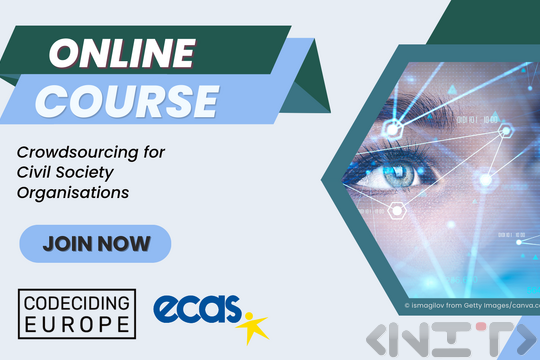
Welcome to ECAS's free online course - the "Crowdsourcing for Civil Society Organizations", designed to give you the skills and knowledge to harness the potential of crowdsourcing for effective citizen participation.
Enroll Now for Free
This free online course is thoughtfully crafted to cover a wide range of crowdsourcing topics, offering a comprehensive understanding of its application in citizen organizations, national contexts, EU-level initiatives, technological frameworks, and citizen engagement campaigns. It draws from the experiences of the 2021-2022 Co-Deciding Europe: Civic Tech for Good Governance and Active Citizenship (CODE Europe) project.
Learning Objectives:
By the end of this course, participants will be able to:
- Utilize crowdsourcing for enhanced citizen participation.
- Understand how crowdsourcing is applied in various contexts, including citizen organizations, national and EU-level initiatives, technological setups, and engagement campaigns.
Course Overview: The course consists of four modules:
Module 1: The Basics of Crowdsourcing This module introduces the fundamental principles of crowdsourcing, its history, and why it’s a powerful tool for engaging citizens. Comparisons will be made with other citizen participation tools used at the EU level, alongside national case studies from Iceland and Finland demonstrating co-decision-making with citizens through crowdsourcing.
Module 2: Crowdsourcing by Citizen Organizations: Case Studies of CODE Europe and DigiDEM Projects This module covers practical insights and lessons from a transnational crowdsourcing initiative on air quality conducted in 10 European countries. It will examine the four phases of the crowdsourcing process, analyze its impact, and offer recommendations for organizations wishing to implement similar projects.
Module 3: IT Solutions for Crowdsourcing This module provides an in-depth look at the technological infrastructure necessary for digital crowdsourcing platforms. It covers platform design, security features, and scalability, offering practical advice on choosing the right technology and ensuring a user-friendly experience.
Module 4: Communicating and Engaging Citizens in Crowdsourcing This module emphasizes the importance of citizen engagement for the success of crowdsourcing efforts. It covers strategies for effective communication, including message framing, storytelling, and utilizing various media channels to reach and involve diverse audiences.
Meet Our Instructors:
-
Assya Kavrakova, Executive Director of ECAS, has over 25 years of experience in senior management in the non-governmental sector. She has expertise in European Citizenship rights, good governance, fundraising, financial sustainability, and EU-related policies, with a strong focus on digital empowerment and democracy.
-
Elisa Lironi, Programme Director for European Democracy at ECAS, has been involved in EU projects and research since 2015. She specializes in digital democracy and e-participation and has authored several works on crowdsourcing in EU legislation.
-
Róbert Bjarnason, President of Citizens Foundation, Iceland, is an expert in democracy and open-source technology. He has a background in AI algorithms and 3D software, with over 25 years of experience, and brings technological insights into digital crowdsourcing.
-
Petko Georgiev, Communications Officer at Proinfo, has over 25 years of media experience. He has worked on communication strategies for public institutions, citizen organizations, and corporate clients. Petko is the lead communication expert for the CODE Europe project, overseeing the first pan-European crowdsourcing initiative.
Enroll Now for Free
The project is co-funded by the CERV programme of the European Union under the EURECA project